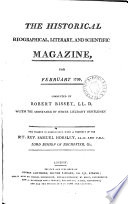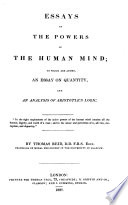 He adopts the theory of ideas in its full extent; and, in consequence, shews that there is neither matter nor mind in the universe; nothing but impressions and ideas. What we call a body, is only a bundle of sensations; and what we call the mind, is only... He adopts the theory of ideas in its full extent; and, in consequence, shews that there is neither matter nor mind in the universe; nothing but impressions and ideas. What we call a body, is only a bundle of sensations; and what we call the mind, is only...  The intellectual sciences; outline lects - Page 108by Barzillai Quaife - 1873Full view The intellectual sciences; outline lects - Page 108by Barzillai Quaife - 1873Full view - About this book
 | Robert Bisset - 636 pages
...but impressions and ideas. What we call a body ia only a bundle of sensations; and what we call the mind is only a bundle of thoughts, passions, and emotions, without any subject. • Some ages hence, says a very profound author,* it will perhaps be tooked upon as a curious anecdote,... | |
 | Thomas Reid - Act (Philosophy). - 1827 - 706 pages
...impressions and ideas. What we call a body, is only a bundle of sensations ; and what we call the wiml, is only a bundle of thoughts, passions, and emotions, without any subject. Some ages hence, it will perhaps be looked upon as a curious aneedote, that two philosophers of the... | |
 | Thomas Reid - Intellect - 1850 - 522 pages
...but impressions and ideas. What we call a body is only a bundle of sensations ; and what we call the mind is only a bundle of thoughts, passions, and emotions, without any subject.* * Dr. Reid had said, in another connection, — "The author of the Treatise of Human Nature appears... | |
 | H. Coleman - Ethics - 1865 - 234 pages
...nothing but impressions and ideas. What we call a body is only a bundle of sensations ; what we call a mind is only a bundle of thoughts, passions, and emotions without any subject. It -will be thus seen that two philosophers of very opposite views on other points — the Spiritualist... | |
 | David Graham - Common sense - 1908 - 408 pages
...impressions " and " ideas." What we call a body is only a bundle of sensations ; and what we call a mind is only a bundle of thoughts, passions and emotions without any subject. Now the great sceptic's doctrine herein set forth — both as to the internal and external worlds,... | |
 | Thomas Reid, William Hamilton, Harry M. Bracken, Thomas Reid, Sir William Hamilton - Knowledge, Theory of - 1094 pages
...impressions and ideas. What we call a brnly, is only a bundle of sensations ; aud what we call the mind is only a bundle of thoughts, passions, and emotions, without any subject. [187] philosophers to beware of hypotheses, especially when they lead to conclusions which contradict... | |
 | Peter Gilmour - History - 1990 - 206 pages
...but impressions and ideas. What we call a body is only a bundle of sensations; and what we call the mind is only a bundle of thoughts, passions and emotions, without any subject' (IP II.xii,293a). Hume's theory, as Reid understood it, was thus one of total scepticism. Reid did... | |
 | Philip De Bary - Skepticism - 2002 - 224 pages
...but impressions and ideas. What we call a body, is only a bundle of sensations; and what we call the mind is only a bundle of thoughts, passions, and emotions, without any subject. [293a] But Reid's 'slippery slope' version in this period in the history of philosophy, despite (or... | |
| |